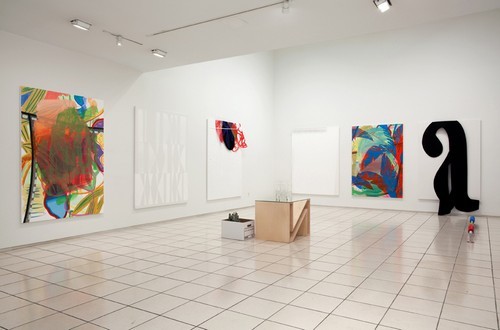Blake Rayne
09 May - 26 Jun 2010
BLAKE RAYNE
“Folder and Application”
Dates: May 9 – June 26, 2010
Reception: Sunday, May 9, 6 – 8PM
Miguel Abreu Gallery is pleased to present Blake Rayne’s Folder and Application, the artist’s third solo exhibition at the gallery. On view are a new series of paintings and floor works that are collectively structured by the protocols of application writing. Rayne’s work deftly traverses this organizing principle with its inherent semantic play. The “application folder” is modulated and distorted throughout the exhibition in a variety of slips and puns that signal broader contexts of material production, word processing, and employment. Indeed, one imagines that the figure who circulates throughout this exhibition (perhaps named “the folder”) is an artist in the situation of either only being precariously capable of applying his or herself to the vagaries of artistic self-representation, or one who is nimbly able to dodge its mandates. Out of this ambiguity, Rayne re-programs the application of the painter’s resources – computer, canvas, paint – as they are scripted within the social domain of artistic production.
The paintings in Folder and Application oscillate between strict chromatic reduction and the decorative logic of the applied arts. In much of this work, the activities of folding, spraying and stitching that have featured as dominant components in the construction of Rayne’s work for the past several years reappear in this exhibit as codified and elastic terms. These productive procedures surface here in a strangely distanced guise; as if to offer confirmation of a subject as much enveloped in a field of painting’s historical forms as he is preoccupied with applying himself to the task of employing them for use.
Rayne engages painting’s history as a field of tensions that compose the practice of painting as cultural sign. He attempts to work through the need for historical competence in understanding the possible relevance of painting
for both the painter’s level of self-consciousness and for forces of legitimation within a corporate culture of information. This suggests that the sign “painting” is on the one hand always compensatory for other cultural interests. Nevertheless it also suggests a field of evasions and deflections, a material practice in which the artist is constantly displaced by language while being administered by institutional demands for certain types of artistic subjects: whether the latter be the hack enfant-terrible or the artist intent on legitimizing his/her endeavors with a trove of cultural reference. To some degree, Rayne attempts to organize a recognition of this dislocation by focusing on its more mundane and marginalized aspects: the laborious task of arranging one’s self-presentation for the filing of an application. Yet Rayne explodes the fixity of the terms of this arrangement in an attempt to open the possibility for examining the conditions of artistic self-enablement and perhaps, for agency.
“Folder and Application”
Dates: May 9 – June 26, 2010
Reception: Sunday, May 9, 6 – 8PM
Miguel Abreu Gallery is pleased to present Blake Rayne’s Folder and Application, the artist’s third solo exhibition at the gallery. On view are a new series of paintings and floor works that are collectively structured by the protocols of application writing. Rayne’s work deftly traverses this organizing principle with its inherent semantic play. The “application folder” is modulated and distorted throughout the exhibition in a variety of slips and puns that signal broader contexts of material production, word processing, and employment. Indeed, one imagines that the figure who circulates throughout this exhibition (perhaps named “the folder”) is an artist in the situation of either only being precariously capable of applying his or herself to the vagaries of artistic self-representation, or one who is nimbly able to dodge its mandates. Out of this ambiguity, Rayne re-programs the application of the painter’s resources – computer, canvas, paint – as they are scripted within the social domain of artistic production.
The paintings in Folder and Application oscillate between strict chromatic reduction and the decorative logic of the applied arts. In much of this work, the activities of folding, spraying and stitching that have featured as dominant components in the construction of Rayne’s work for the past several years reappear in this exhibit as codified and elastic terms. These productive procedures surface here in a strangely distanced guise; as if to offer confirmation of a subject as much enveloped in a field of painting’s historical forms as he is preoccupied with applying himself to the task of employing them for use.
Rayne engages painting’s history as a field of tensions that compose the practice of painting as cultural sign. He attempts to work through the need for historical competence in understanding the possible relevance of painting
for both the painter’s level of self-consciousness and for forces of legitimation within a corporate culture of information. This suggests that the sign “painting” is on the one hand always compensatory for other cultural interests. Nevertheless it also suggests a field of evasions and deflections, a material practice in which the artist is constantly displaced by language while being administered by institutional demands for certain types of artistic subjects: whether the latter be the hack enfant-terrible or the artist intent on legitimizing his/her endeavors with a trove of cultural reference. To some degree, Rayne attempts to organize a recognition of this dislocation by focusing on its more mundane and marginalized aspects: the laborious task of arranging one’s self-presentation for the filing of an application. Yet Rayne explodes the fixity of the terms of this arrangement in an attempt to open the possibility for examining the conditions of artistic self-enablement and perhaps, for agency.

